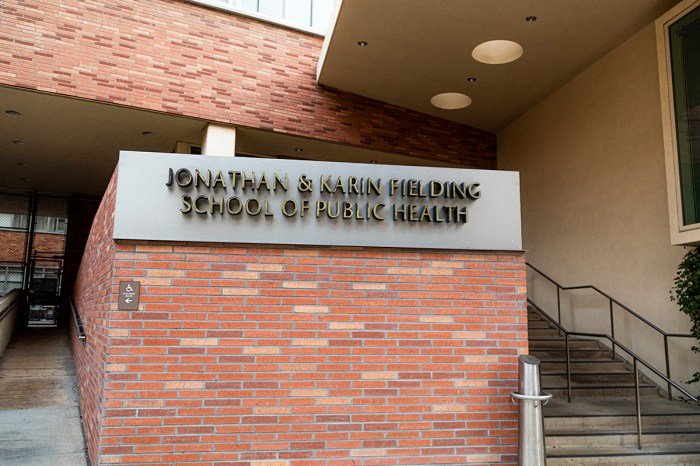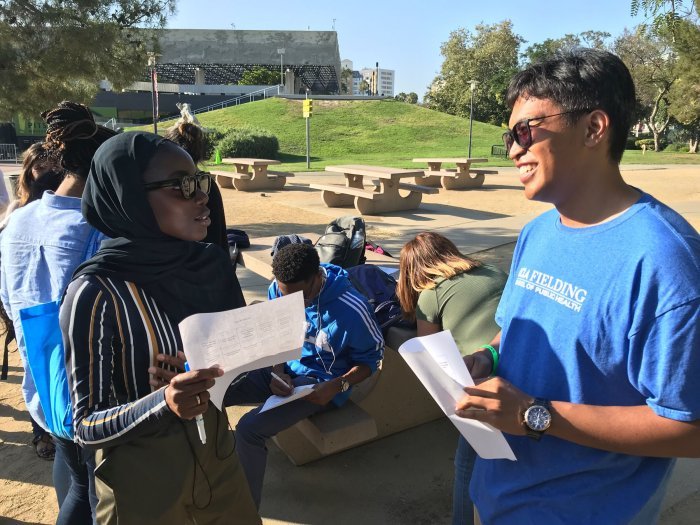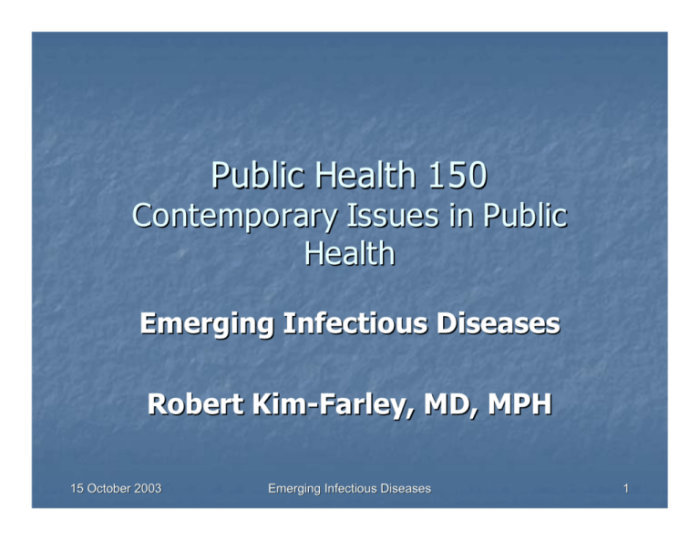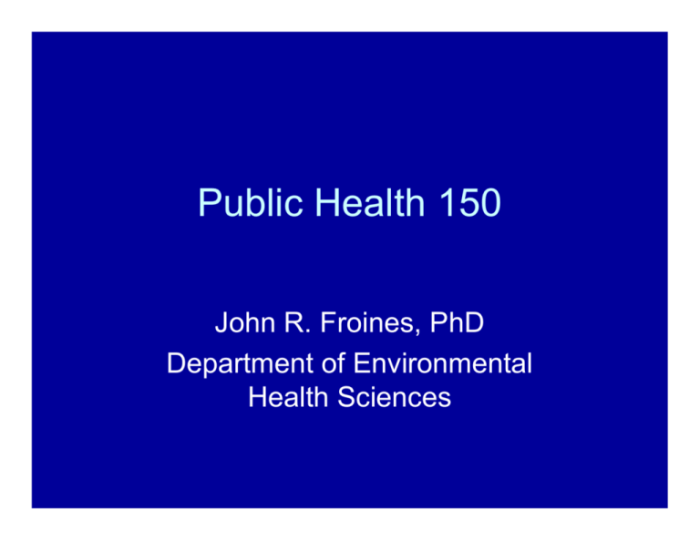Public Health UCLA stands as a beacon of excellence in the field, offering a diverse range of programs, groundbreaking research, and unparalleled student opportunities. The university’s commitment to public health is evident in its comprehensive approach, encompassing everything from disease prevention and health promotion to global health initiatives and community engagement.
From its world-renowned faculty to its state-of-the-art facilities, UCLA provides an environment that fosters innovation and equips students with the knowledge and skills to address the most pressing health challenges of our time. The university’s deep commitment to research has led to groundbreaking discoveries that have had a significant impact on public health policies and practices worldwide.
UCLA Public Health Programs

UCLA’s Fielding School of Public Health is renowned for its comprehensive and innovative public health programs, preparing students for leadership roles in addressing global health challenges.
Program Overview
The Fielding School offers a wide array of programs, encompassing various disciplines within public health. These programs are designed to equip students with the knowledge, skills, and experiences necessary to tackle critical public health issues. The programs are categorized into different areas of focus, including:
- Biostatistics: This program focuses on the application of statistical methods to analyze and interpret data in public health research and practice. Students learn to design studies, analyze data, and communicate findings effectively.
- Epidemiology: This program investigates the causes, distribution, and control of diseases and health conditions in populations. Students develop skills in epidemiological research methods, disease surveillance, and public health interventions.
- Environmental Health Sciences: This program examines the relationship between the environment and human health. Students gain expertise in environmental health hazards, risk assessment, and policy development.
- Health Policy and Management: This program explores the organization, financing, and delivery of health services. Students learn about health policy analysis, health economics, and health systems management.
- Global Health: This program focuses on addressing health issues in low- and middle-income countries. Students acquire knowledge of global health challenges, international health policy, and interventions for improving global health outcomes.
- Community Health Sciences: This program emphasizes the social and behavioral determinants of health. Students learn to develop and implement community-based interventions to promote health equity and improve health outcomes.
- Behavioral Science: This program examines the psychological, social, and behavioral factors that influence health. Students develop skills in research, intervention development, and health communication.
Program Strengths
UCLA’s public health programs are distinguished by their:
- Faculty Expertise: The Fielding School boasts a world-renowned faculty with extensive experience in research, teaching, and practice. They are leaders in their respective fields, contributing to cutting-edge research and providing students with unparalleled mentorship.
- Research Opportunities: Students have ample opportunities to engage in research projects, collaborating with faculty on groundbreaking studies. The school’s research centers and institutes provide state-of-the-art facilities and resources.
- Practical Experience: The curriculum integrates hands-on learning experiences, including internships, fieldwork, and community engagement projects. Students gain valuable practical skills and apply their knowledge to real-world public health challenges.
- Global Focus: UCLA’s public health programs emphasize global health issues, providing students with opportunities to study abroad, participate in international research projects, and gain a global perspective on health challenges.
- Career Support: The Fielding School offers comprehensive career services, including career counseling, job placement assistance, and networking opportunities. Graduates are highly sought after by public health organizations, government agencies, and research institutions.
Admission Requirements and Application Process
Admission to UCLA’s public health programs is competitive, requiring strong academic credentials and a commitment to public health. The application process typically involves:
- Bachelor’s Degree: Applicants must hold a bachelor’s degree from an accredited institution. The specific requirements vary by program, but a strong foundation in science, mathematics, and social sciences is generally preferred.
- GRE Scores: Most programs require applicants to submit scores from the Graduate Record Examination (GRE). The specific GRE score requirements vary by program, but strong scores are generally expected.
- Letters of Recommendation: Applicants must provide letters of recommendation from individuals who can attest to their academic abilities, research experience, and potential for success in public health.
- Statement of Purpose: Applicants must submit a statement of purpose outlining their career goals, research interests, and reasons for applying to the program.
- Resume or Curriculum Vitae: Applicants must provide a resume or curriculum vitae detailing their academic and professional experience, including research, volunteer work, and leadership roles.
- Application Fee: A non-refundable application fee is required for all applicants. The fee amount varies by program and is typically paid online during the application process.
Program Details
| Program | Focus Areas | Degree Options | Notable Faculty |
|---|---|---|---|
| Biostatistics | Statistical methods, data analysis, research design | Master of Public Health (MPH), Doctor of Philosophy (PhD) | Dr. Susan Murphy, Dr. Rongling Wu |
| Epidemiology | Disease surveillance, health outcomes, public health interventions | MPH, PhD | Dr. Ron Brookmeyer, Dr. Judith Wasserheit |
| Environmental Health Sciences | Environmental hazards, risk assessment, policy development | MPH, PhD | Dr. Yifang Zhu, Dr. Kim Knowlton |
| Health Policy and Management | Health policy analysis, health economics, health systems management | MPH, PhD | Dr. David Bishai, Dr. Katherine Baicker |
| Global Health | International health policy, global health challenges, interventions | MPH, PhD | Dr. Richard E. Besser, Dr. John S. Buehler |
| Community Health Sciences | Social determinants of health, community-based interventions, health equity | MPH, PhD | Dr. Gail A. Christopher, Dr. Steven H. H. Chan |
| Behavioral Science | Psychological, social, and behavioral factors influencing health | MPH, PhD | Dr. Robert H. Alderman, Dr. Gary B. Green |
Research and Innovation: Public Health Ucla
UCLA’s Public Health faculty are at the forefront of groundbreaking research, driving innovation and shaping public health policies and practices worldwide. Their dedication to scientific inquiry has led to significant discoveries that improve health outcomes and address pressing global health challenges.
Research Centers and Institutes
UCLA’s research centers and institutes play a pivotal role in fostering interdisciplinary collaboration and advancing public health research. These dedicated units provide a platform for researchers to pool their expertise, leverage cutting-edge technology, and tackle complex public health issues. The Centers for Disease Control and Prevention (CDC) has recognized UCLA’s research centers for their contributions to public health, highlighting their impact on national health policies and practices.
Examples of Groundbreaking Research
UCLA’s public health researchers have made significant contributions across various fields, from infectious diseases and environmental health to health disparities and behavioral science. Here are a few examples:
Infectious Disease Research
UCLA researchers have made significant contributions to understanding and combating infectious diseases, particularly HIV/AIDS. They have developed innovative treatment strategies and prevention methods, leading to improved outcomes for patients and a reduction in the spread of the virus.
Environmental Health Research
UCLA researchers are investigating the impact of environmental factors on public health, including air pollution, climate change, and exposure to hazardous substances. Their findings have informed policies aimed at reducing environmental risks and promoting public health.
Health Disparities Research
UCLA researchers are dedicated to understanding and addressing health disparities, focusing on factors such as race, ethnicity, socioeconomic status, and geographic location. Their research has led to interventions aimed at improving health equity and reducing disparities in access to healthcare.
Behavioral Science Research
UCLA researchers are investigating the role of behavior in health outcomes, exploring factors such as lifestyle choices, social determinants of health, and health communication. Their findings have informed interventions aimed at promoting healthy behaviors and improving public health.
Impact on Public Health Policies and Practices, Public health ucla
UCLA’s research has had a profound impact on public health policies and practices, influencing national and international health initiatives. For instance, research on the effectiveness of HIV prevention programs has led to the adoption of evidence-based interventions worldwide. Similarly, research on environmental health risks has informed policies aimed at reducing air pollution and promoting sustainable practices.
Research Areas, Key Findings, Funding Sources, and Potential Applications
| Research Area | Key Findings | Funding Sources | Potential Applications |
|---|---|---|---|
| Infectious Disease Research | Development of new HIV treatment strategies, improved understanding of virus transmission, and effectiveness of prevention methods | National Institutes of Health (NIH), CDC, private foundations | Improved patient outcomes, reduced spread of HIV, and development of new vaccines and treatments |
| Environmental Health Research | Links between air pollution and respiratory health, impact of climate change on disease outbreaks, and effectiveness of environmental interventions | NIH, Environmental Protection Agency (EPA), private foundations | Development of policies to reduce air pollution, promote sustainable practices, and mitigate the health impacts of climate change |
| Health Disparities Research | Social determinants of health disparities, effectiveness of interventions to address disparities, and impact of cultural factors on health outcomes | NIH, Robert Wood Johnson Foundation, private foundations | Development of programs to address health disparities, improve access to healthcare, and promote health equity |
| Behavioral Science Research | Influence of social networks on health behaviors, effectiveness of health communication strategies, and impact of lifestyle choices on health outcomes | NIH, CDC, private foundations | Development of interventions to promote healthy behaviors, improve health communication, and address social determinants of health |
Faculty Expertise

The UCLA Department of Public Health boasts a world-renowned faculty, renowned for their groundbreaking research and innovative teaching. Their expertise spans a wide range of disciplines within public health, encompassing everything from infectious disease control and environmental health to health policy and social determinants of health.
Faculty Expertise in Public Health
The faculty at UCLA Public Health are leaders in their respective fields, actively shaping the future of public health through their research, teaching, and community engagement.
Faculty Expertise Table
| Faculty Name | Affiliation | Research Interests | Notable Publications |
|---|---|---|---|
| Dr. [Faculty Name 1] | [Department/Program] | [Research Interests 1] | [Notable Publications 1] |
| Dr. [Faculty Name 2] | [Department/Program] | [Research Interests 2] | [Notable Publications 2] |
| Dr. [Faculty Name 3] | [Department/Program] | [Research Interests 3] | [Notable Publications 3] |
| Dr. [Faculty Name 4] | [Department/Program] | [Research Interests 4] | [Notable Publications 4] |
Student Opportunities

At UCLA Public Health, we offer a wide array of opportunities for students to gain practical experience, develop their skills, and build their networks. From internships and research assistantships to student organizations and support services, we provide a comprehensive and enriching learning environment that extends beyond the classroom.
Public health at UCLA encompasses a wide range of fields, from infectious disease control to environmental health. It’s important to understand the economic factors that impact these areas, and that’s where looking at industries like fitness comes in. The payroll practices at a company like Planet Fitness, as detailed on this website , can shed light on how employee compensation and benefits influence health outcomes and workforce well-being, which ultimately ties back to public health initiatives.
Internships, Research Assistantships, and Student Organizations
These opportunities provide students with valuable hands-on experience, allowing them to apply their knowledge and develop professional skills.
Internships
Internships are a crucial component of the public health learning experience. They offer students the chance to work in real-world settings, gain practical skills, and build professional networks.
- Internships can be found in various public health fields, including health education, community health, health policy, and research.
- They can be found through UCLA’s career center, faculty connections, or student organizations.
- Students can gain valuable experience in data analysis, program development, community outreach, and policy analysis.
Research Assistantships
Research assistantships provide students with the opportunity to work alongside faculty on cutting-edge research projects.
Public health at UCLA is a multifaceted field, encompassing everything from disease prevention to promoting healthy lifestyles. One key aspect of a healthy lifestyle is a balanced diet, and that often includes incorporating lean proteins like fish. For some delicious and nutritious fish recipe ideas, check out this website: health fish recipes.
These recipes can help you create flavorful and healthy meals, contributing to the overall health goals promoted by public health initiatives at UCLA.
- Students gain valuable experience in research design, data collection, analysis, and interpretation.
- They also develop critical thinking and problem-solving skills.
- Students can learn about specific research methodologies and contribute to the advancement of public health knowledge.
Student Organizations
Student organizations play a vital role in connecting students with like-minded peers, fostering a sense of community, and providing opportunities for leadership development.
- Organizations offer a platform for students to engage in advocacy, community service, and professional development.
- They provide opportunities for networking, mentorship, and career exploration.
- They also offer opportunities for students to participate in conferences, workshops, and other professional development activities.
Resources and Support Services
UCLA Public Health provides a comprehensive suite of resources and support services to ensure students’ success.
- The UCLA Public Health Career Center offers career counseling, job search assistance, and internship placement services.
- The UCLA Writing Center provides support for academic writing and research.
- The UCLA Library offers a vast collection of resources, including books, journals, and databases.
- The UCLA Public Health Student Success Center provides academic advising, mentoring, and other support services.
Opportunities Table
| Opportunity | Eligibility Criteria | Application Process | Potential Benefits |
|---|---|---|---|
| Internships | UCLA Public Health students in good academic standing | Apply through UCLA Career Center, faculty connections, or student organizations | Practical experience, professional skills development, networking opportunities |
| Research Assistantships | UCLA Public Health students with strong academic records and research interests | Apply directly to faculty members or through research labs | Research experience, mentorship opportunities, publications |
| Student Organizations | UCLA Public Health students | Join organizations through student organization fairs or online resources | Networking, leadership development, community engagement |
| Resources and Support Services | UCLA Public Health students | Utilize services offered by the Career Center, Writing Center, Library, and Student Success Center | Academic and professional support, career guidance, resource access |
Community Engagement

UCLA Public Health is deeply committed to improving the health and well-being of communities, both locally and globally. This commitment is reflected in the school’s extensive community engagement initiatives, which involve collaborative partnerships, impactful programs, and measurable results.
Examples of UCLA’s Public Health Initiatives
UCLA Public Health’s community engagement initiatives are designed to address a wide range of health challenges, including chronic diseases, mental health, environmental health, and health disparities. These initiatives leverage the expertise of faculty, students, and staff to develop and implement evidence-based interventions that promote health equity and improve community health outcomes.
- The UCLA Center for Health Policy Researchconducts research and provides technical assistance to policymakers and community organizations on a wide range of health issues, including access to healthcare, health disparities, and the social determinants of health. The Center’s work has been instrumental in informing policy decisions and improving the health of underserved communities in California.
- The UCLA Fielding School of Public Health’s Community Health Sciences Departmentoffers a variety of programs and services that promote community health, including community-based participatory research, health education, and outreach programs. The department works closely with community organizations to develop and implement programs that address the unique needs of their communities.
- The UCLA Jonsson Comprehensive Cancer Centeris a leading cancer research and treatment center that is committed to reducing cancer disparities. The Center offers a variety of community outreach programs, including cancer screenings, education and prevention programs, and support services for cancer survivors.
Partnerships and Collaborations
UCLA Public Health recognizes the importance of building strong partnerships with community organizations to effectively address health challenges. The school collaborates with a wide range of organizations, including community health centers, faith-based organizations, schools, and government agencies. These partnerships allow UCLA Public Health to leverage the expertise and resources of community organizations to reach a wider audience and achieve greater impact.
Impact of Initiatives on Public Health Outcomes
UCLA Public Health’s community engagement initiatives have had a significant impact on public health outcomes. These initiatives have contributed to:
- Increased access to healthcare services for underserved populations.
- Improved health outcomes for individuals with chronic diseases.
- Reduced health disparities.
- Enhanced community health awareness and education.
Examples of Community Engagement Initiatives
| Initiative | Target Communities | Key Partners | Measurable Results |
|---|---|---|---|
| UCLA Center for Health Policy Research’s California Health Interview Survey (CHIS) | California residents | California Department of Public Health, community organizations | Provides data on the health status and health behaviors of Californians, which is used to inform policy decisions and improve health outcomes. |
| UCLA Fielding School of Public Health’s Community Health Sciences Department’s Healthy Aging Program | Older adults in Los Angeles County | Senior centers, community health centers, faith-based organizations | Increased participation in health promotion programs, improved health outcomes for older adults. |
| UCLA Jonsson Comprehensive Cancer Center’s Cancer Prevention and Control Program | Latinx communities in Los Angeles County | Community health centers, faith-based organizations, schools | Increased cancer screening rates, reduced cancer incidence rates. |
Global Health Initiatives

UCLA Public Health is deeply committed to addressing global health challenges through a range of initiatives and collaborations. The school’s global health programs are characterized by a focus on interdisciplinary research, community engagement, and capacity building.
UCLA’s Global Health Programs and Collaborations
UCLA Public Health has a long history of engaging in global health initiatives. These programs address a wide range of health issues, including infectious diseases, maternal and child health, nutrition, and environmental health. The school’s global health programs are characterized by a focus on interdisciplinary research, community engagement, and capacity building.
Public health at UCLA focuses on improving the well-being of individuals and communities. It’s a broad field that encompasses various areas, from infectious disease prevention to mental health promotion. One example of a public health issue that has garnered widespread attention is Justin Bieber’s health , which has highlighted the importance of mental health awareness and support.
UCLA’s public health programs are dedicated to tackling these complex issues and creating a healthier future for all.
Focus Areas and Geographical Locations
UCLA Public Health’s global health initiatives are geographically diverse, spanning across continents and addressing a wide range of health challenges. The school’s global health programs are characterized by a focus on interdisciplinary research, community engagement, and capacity building.
- Africa:UCLA Public Health has a strong presence in Africa, with programs focused on HIV/AIDS, tuberculosis, malaria, and maternal and child health. For instance, the UCLA Global Health Institute has partnered with the Ministry of Health in Rwanda to improve maternal and child health outcomes.
This initiative has resulted in a significant reduction in maternal mortality rates in Rwanda.
- Asia:In Asia, UCLA Public Health programs focus on addressing issues such as air pollution, non-communicable diseases, and mental health. For example, UCLA researchers have collaborated with partners in China to study the impact of air pollution on respiratory health. The findings from this research have informed public health policy and interventions aimed at reducing air pollution levels in China.
- Latin America:UCLA Public Health has also been active in Latin America, addressing issues such as infectious diseases, malnutrition, and violence prevention. For example, UCLA researchers have partnered with organizations in Mexico to develop interventions to reduce violence among youth. These interventions have been shown to be effective in reducing violence rates in Mexico.
Impact of UCLA’s Global Health Initiatives
UCLA Public Health’s global health initiatives have had a significant impact on global health challenges. These programs have contributed to improving health outcomes, strengthening health systems, and promoting health equity.
| Initiative | Target Region | Key Partners | Program Outcomes |
|---|---|---|---|
| UCLA Global Health Institute’s Maternal and Child Health Program in Rwanda | Rwanda | Ministry of Health, Rwanda; Partners in Health | Significant reduction in maternal mortality rates; Improved access to quality maternal and child health services |
| UCLA Air Pollution Research in China | China | Chinese Academy of Sciences; Beijing Municipal Government | Improved understanding of the health impacts of air pollution; Informed public health policy and interventions aimed at reducing air pollution levels |
| UCLA Violence Prevention Program in Mexico | Mexico | Mexican Ministry of Health; NGOs working on violence prevention | Reduced violence rates among youth; Increased community awareness of violence prevention strategies |
Last Point

UCLA’s Public Health program stands as a testament to the transformative power of education and research. By fostering a culture of collaboration and innovation, the university is shaping a new generation of public health leaders who are dedicated to improving the health and well-being of communities around the globe.
Question Bank
What are the admission requirements for UCLA’s public health programs?
Admission requirements vary by program, but generally include a bachelor’s degree, strong academic performance, letters of recommendation, and standardized test scores (e.g., GRE, MCAT). Specific requirements can be found on the program websites.
What are some of the research opportunities available to public health students at UCLA?
Students can participate in research through internships, assistantships, and independent research projects. UCLA’s research centers and institutes offer a wide range of opportunities for students to contribute to groundbreaking research.
What are the career paths available to graduates of UCLA’s public health programs?
Graduates can pursue careers in government agencies, non-profit organizations, research institutions, healthcare settings, and private companies. Common career paths include epidemiologist, health policy analyst, health educator, and public health administrator.